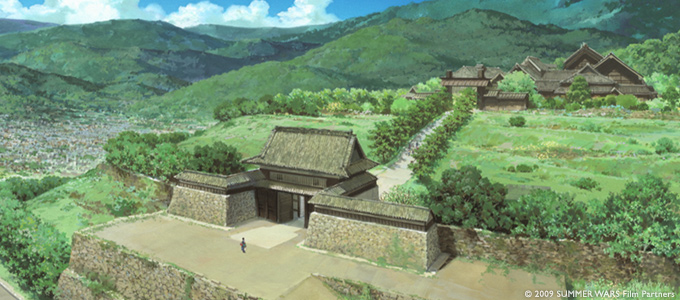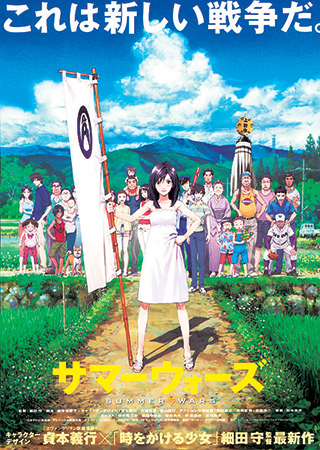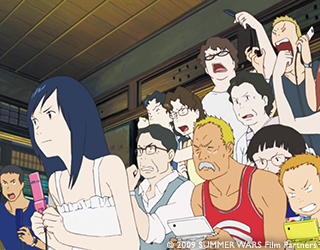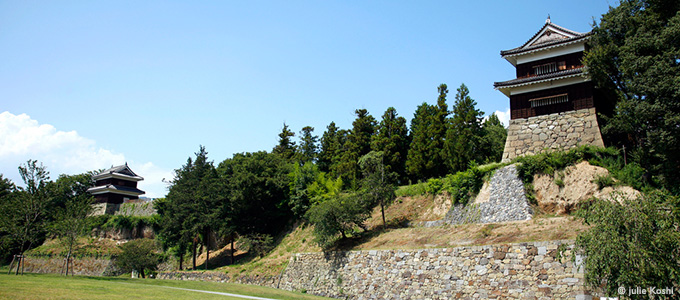
All That’s Left of Ancient Warriors’ Dreams
The ability to affirm everyday life is essential for the films of Director Hosoda, who has placed importance in his work’s universal reception. This gives us viewers, who actually live in that very common day-to-day, the enthusiasm to get closer to the extension of our own story called life, or even to the past and future that exist on a parallel plain.
“Movies originally use misfits as main characters, like monsters and yakuza. It's an inverted world where you regularly depict what’s out of the ordinary. So, in that domain where the abnormal is normal, it takes a lot of courage to make ordinary everyday life your main theme. This is me trying very hard to be avant-garde in how I approach my filmmaking.”
“If I am putting in the energy to make a movie, I’d rather do something innovative. But in my situation, people may see me as very conservative, since the word ‘innovation’ comes full circle in this realm of film. But that’s because I am in fact approaching the opposite of the opposite. You know, it’s what’s normal in films to tell a story of the yakuza (laugh).”

“It’s common in films to convey that ‘life is pointless,’ and that to me, as a conclusive message, is very dull. It is expected that the power to deny life is stronger than the power to uphold it. It’s easier to reject life, and I do think it makes a bolder impression. But for me, I want the strength to go out of my way to endorse something that we believe is hard to ratify. On top of it all, if the movie took many people to make it, then I want plenty of people to go see it. Furthermore, for an endeavor so great as delivering a movie to this world, I can’t let it have an aimless conclusion such as ‘life is pointless.’”
Director Hosoda’s ambition has been consistent in the way of adamantly endorsing life. In his 2009 directorial work Summer Wars, Hosoda successfully affirms and portrays ‘relatives,’ possibly the most ordinary theme, yet a very rare topic in modern cinema. This triumph seemed to have resulted from his own marriage that brought him a whole new family, and the encounter with their beloved land Ueda of Shinshu.
“Until I got married, I believed that relatives disputed. My own home experience included, I simply resorted to ‘Well, that’s where human kind falters.’ (laugh) But my wife’s whole extended family gets along very well. To be honest, I was shocked to learn that families like that existed. In addition, those people became my family all at once! Since that was so amusing to me, all of a sudden I got really curious about it.”
“They probably get along famously because the father-in-law had married into the family. My wife’s family is a matriarchy, so the grandpa and father-in-law are the types to cater to women. It’s a household run by women protagonists. These days I enjoy seeing the new hobby my father-in-law is challenging himself with in his retired life. The year before last was curing ham, last year was making wine. I don’t know if it was because it was homemade, but I had to drink his wine that was cloudy like unfiltered liquor… (laugh) Looks like this year’s theme is beekeeping. I think it is so luxurious to savor your everyday doing something using your bare hands.”
“My relatives in Ueda seem warm and laid-back. That is probably thanks to the weather among other things. Although located in Nagano, Ueda has very little precipitation and snow, so it is one of the places with clearer weather in Japan. In fact, for that very reason it has been well used as a film shoot location. There is no special scenery to speak of, but since it always has blue skies, there is no waiting time for rain. That fair-weather nature seems to be a part of Ueda’s spirit.”
Other than the good climate and local flavor, the draw to “Shinshu Ueda*” is also said to be the local pride and love for its history inherited from their ancestors. Especially the Sengoku Era’s celebrated warlord Masayuki Sanada**, the hero of Ueda, and his clan is a heroic legend that has been passed down through generations.

Toward the end of the Sengoku Era, 40,000 soldiers led by Hidetada Tokugawa headed west from Mito as a reinforcement to the Battle of Sekigahara. Along the way on Nakasendo Trail, they attacked Sanada Clan’s Ueda Castle. With merely 2,000 men at hand but with brilliant war strategies that Masayuki Sanada was well known for, his army stunned, dominated, and defeated the invading troops, defending their castle from Hidetada. The people from Ueda are well acquainted with this tale and heard it since childhood. The person who told this story to Director Hosoda was no other than his wife who grew up in Ueda.
“Everyone from Ueda carries their pride of their ancestral history in some form. Even though they were a tiny group, they were able to put their forces together, never yielding, and fought to protect their land against their enemy that seemed impossible to beat. Even now, there seems to be a strong will carried on to not get defeated by something larger.”
“A place can become seemingly endearing, not only by its visible scenery, but by getting to know the history behind it. And that also makes the local people look authentic. Ueda is one of those places.”
“In Ueda there is a ruin of a mountain castle called Toishi Castle Site that the Sanada clan used before moving to the Ueda Castle. For Summer Wars, it’s where I staged the Jinnouchi family home, on the ruins of a castle where you can see the whole town of Ueda from 800m above. It’s a site of a castle, yet now there are only red pines growing there. (laugh) But if you let your mind run wild with history and look again, strangely the view is totally different. Like ‘oh, this is the place where they used to be…’”
The summer grass - it is all that's left of ancient warriors' dreams ***
While strongly affirming the ordinary scenery that once received the warriors’ gaze, Director Hosoda’s eyes may reflect a world that is the opposite, and yet another opposite, of what is considered pointless.
* A historical name for the area of Nagano Prefecture, Japan.
** Masayuki Sanada (1544-1611). Father of Yukimura Sanada.
*** Basho Matsuo’s haiku from the 17th Century

